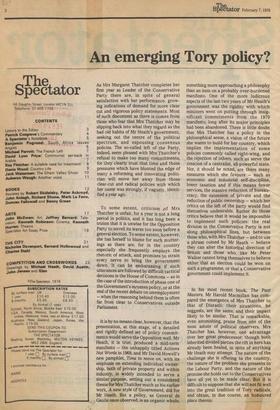An emerging Tory policy?
As Mrs Margaret Thatcher completes her first year as Leader of the Conservative Party there are, in spite of general satisfaction with her performance, growing indications of demand for more clear cut and vigorous policy statements. Most of such discontent as there is comes from those who fear that Mrs Thatcher may be slipping back into what they regard as the 'bad old habits of Mr Heath's government, seeking out the centre of the political spectrum, and espousing consensus policies. The so-called left of the Party, indeed, seem pleased with Mrs Thatcher's refusal to make too many commitments, for they clearly trust that time and those pressures which have blunted the edge of many a reforming and innovating politician will move her away from those clear-cut and radical policies with which her name was strongly, if vaguely, identified a year ago.
To some extent, criticism of Mrs Thatcher is unfair, for a year is not a long period in politics, and it has long been a truism that it is unwise for the Opposition Party to unveil its wares too soon before a general election. To some extent, however, she has herself to blame for such mutterings as there are, for in the country especially she frequently employs the rhetoric of attack, and promises to strain every nerve to bring the government down. It can be embarassing if such utterances are followed by difficult tactical decisions in the House of Commons — as in the case of the introduction of phase one of the Government's inr.omes policy, or at the end of the recent debate on unemployment — when the reasoning behind them is often far from clear to Conservatives outside Parliament.
It is by no means clear, however, that the presentation, at this stage, of a detailed and rigidly defined set of policy commitments would serve the Opposition well. Mr Heath, it is true, produced a mid-term manifesto — the unhappily titled Actions Not Words in 1968; and Mr David Howell's new pamphlet, Time to move on, with its emphasis on extending individual ownership, both of private property and within industry, is widely intended to serve a similar purpose, setting out a considered theme for Mrs Thatcher much as his earlier work, A new style of Government, did for Mr Heath. But a policy, as General de Gaulle once observed, is an organic whole, something more approaching a philosophy than an item on a probably over-burdened manifesto. One of the more ludicrous aspects of the last two years of Mr Heath's government was the rigidity with which ministers went on putting through insignificant commitments from the 1970 manifesto, long after its major principles had been abandoned. There is little doubt that Mrs Thatcher has a policy in the philosophical sense, a vision of the future she wants to build for her country, which implies the implementation of some policies commonly called right-wing, and the rejection of others, such as serve the creation of a centralist, all-powerful state. Nor, it should be noted, are there many measures which she favours — such as economic and industrial self-discipline, lower taxation and if this means fewer services, the massive reduction of bureaucracy, the extension of private and the reduction of public ownership — which her critics on the left of the party would find themselves undesirable. Rather do those critics believe that it would be impossible to implement such policies: the real division in the Conservative Party is not along philosophical lines, but between those who, with Mrs Thatcher — and to use a phrase coined by Mr Heath — believe they can alter the historical direction of Britain and those who, like Mr Peter Walker cannot bring themselves to believe either that an election could be won on such a programme, or that a Conservative government could implement it.
In his most recent book, The Past Masters, Mr Harold Macmillan has compared the emergence of Mrs Thatcher to that of Disraeli: their situations, he suggests, are the same, and their impact likely to be similar. That is remarkable, even astonishing, praise from one of the most astute of political observers. Mrs Thatcher has, however, one advantage over her great predecessor: though both inherited divided parties the rift in hers has already been healed, in spite of anything Mr Heath may attempt. The nature of the challenge she is offering to the country, the nature of the problem she presents to the Labour Party, and the nature of the promise she holds out to the Conservatives have all yet to be made clear. But it is difficult to suppose that she will not fit well into the great tradition of Tory radicals, and obtain, in due course, an honoured place therein.


























 Previous page
Previous page